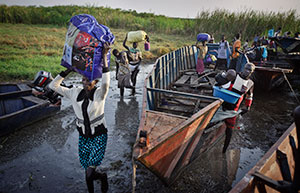
Editor's Note: This op-ed authored by John Prendergast and Eric Reeves originally appeared in The Daily Beast.
With Secretary of State John Kerry traveling to Ethiopia today, site of the peace talks for South Sudan, he will be greeted by a bracing reality: no civilians in the world are in greater danger than those of South Sudan. Not in Syria, Central African Republic, or Darfur is the threat of targeting on the basis of identity so immediate as it is for certain ethnic groups in vulnerable areas of South Sudan. Given the lack of protection by Juba government forces, the inability of UN troops to protect large numbers of people, and the absence of significantly greater protection from the broader international community, hundreds of thousands of people are likely to die in the coming months, whether directly through targeted violence or indirectly through hunger. It is an unsurpassably urgent crisis and yet the world's response has been in no way comparable to the threats civilians now face on a daily basis.
Following the political and military events of mid-December when targeted violence erupted in Juba, capital of South Sudan, conflict has steadily escalated. Now, more than four months later, we are witnessing events that have all the hallmarks of genocide. The split in South Sudan's army—the Sudan People's Liberation Army (SPLA)—has been largely along ethnic lines, primarily between the Dinka, the largest tribal group in the South, and the Nuer, the second largest tribal group. As a consequence of this split, what appeared initially to be a vehement demand for governance reforms—but without evident military goals—has developed into a full-scale military rebellion, with violence escalating into something like "symmetric warfare" between two forces that are comparably trained and armed.
Unlike the "asymmetric warfare" to which we have become accustomed to hearing about (e.g., Iraq, Afghanistan, Darfur), symmetric warfare ensures heavy casualties in military confrontations. But victories and defeats now have more ominous consequences; for in South Sudan the victors see military victory as justifying civilian slaughter of the predominant ethnic group of the opposing forces. And with a terrifying momentum, ethnic slaughter leads to yet greater ethnic slaughter. When the town of Bentiu in oil-rich Unity State fell to rebel forces on April 15-16, hundreds of Dinka civilians (and many Darfuris) were hunted down and killed—men, women, and children. Hate radio locally broadcast locally urged the rape and murder of Dinkas—or even Nuer who were not enthusiastic enough about the victory. Meanwhile, in Bor (Jonglei State), Nuer civilians under the protection of the UN force (UNMISS, UN Mission in South Sudan) made the mistake of celebrating the victory of the rebels in Bentiu; in reprisal, a large gang of Dinka youth broke into the UN compound and killed dozens of Nuer. We have seen earlier versions of this vicious ethnic violence in Malakal (Upper Nile) and in other smaller towns, as well as Juba itself.
Continue reading this op-ed on The Daily Beast website.
Photo: Internally displaced persons fleeing Bor, South Sudan, in January 2014 (AP Photo/Ben Curtis).

